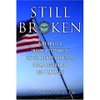Recently, cable network MSNBC posed this question to voters in an exit poll: “With the field of Democratic candidates reduced to two, who would make the best Commander in Chief of the United States Armed Forces?” Senator Hillary Clinton was the clear favorite, besting her male opponent 50% to 35%--a ratio that surprised any number of journalists and, probably, quite a few voters who weren’t among the 50% who chose her.
Not that this is the first time the issue of a woman serving as the ultimate authority for our armed forces has come up. In June 2007, MSNBC anchor/pundit Chris Matthews (yes, him again) expressed his significant doubts about whether voters, women and men alike, would actually pull the lever for a female commander. His guest, New York Times reporter Elizabeth Bumiller, assured him that the voters could “get there,” invoking the historical records of leaders Golda Meir and Margaret Thatcher to persuade him that the military might just take a woman leader seriously.
And then there was the time back in May of 2005 when Matthews reacted with shock to Retired General Barry McCaffery’s suggestion that the troops would have little issue taking orders from Senator Clinton. “Why wouldn’t they listen to a [female] commander in chief?” McCaffrey asked incredulously. “You're chuckling a little bit, aren't you?” Matthews replied.
It’s easy to pick on Matthews for gaffes like these, but he’s not alone in being behind the curve when it comes to voter sentiment on this issue—and that’s partly because attitudes in this realm have been changing at lightening speed. A Roper ASW poll conducted in 2000 showed that 70% of respondents believed that a male president would perform better on foreign policy than a female president would. At the time, a woman president outranked men only on the issues of trustworthiness and honesty.
But by 2007 a similar Roper poll showed a dramatic change: seven years later, more than half of Americans felt that women were either equally suited or better suited to handle the complex issues of foreign policy, homeland security and the economy than their male counterparts.
How did it happen? And how did it happen so fast?
Let’s just call it “Seeing is believing.” Today, Americans have the benefit of a decade spent watching Madeleine Albright and Condoleezza Rice occupy the highest National Security positions in our country. Simply put, Albright and Rice have made it “normal” to have females in those positions by way of their mere presence.
And it’s not just the highest ranking officials who matter. The nightly news from Iraq features women who, whether as enlisted soldiers or as officers, are serving on the front lines of war and in the line of fire. This time around, women are proving themselves as brave and as tough (and sometimes, to our disappointment, as vulnerable to mistakes) as their male colleagues.
Of the over 400 experts on The White House Project’s online data base of women experts that are being placed on network and cable shows each week (SheSource.org), almost 25% of them boast credentials in some aspect of national security. Every week they duke it out with the likes of Pat Buchanan and Bill O’Reilly, or appear on Sunday morning talk shows and the evening news to prove that national security is not just a man’s game.
And don’t go discounting how many people got comfortable with actress Geena Davis deciding where our naval fleet should be deployed and sending Special Forces in for dramatic rescue operations on the short-lived prime time network television show Commander in Chief. The White House Project both built and monitored the show’s audience, and we know that young men, particularly, liked seeing a woman wield this kind of power.
Meanwhile, Senator Clinton herself has served on the Senate Armed Forces Committee and, of course, has suffered for her vote that allowed Bush to go to war in Iraq. But beyond this, she has been able to speak with authority to voters about her plans for withdrawal and ending the war, as well as about the importance of diplomacy.
Then there’s influence the rest of the world has had on us: Increasingly, women like Chancellor Angela Merkel of Germany and President Ellen Johnson Sirleaf of Liberia are showing us not only that women can lead, but that their unique perspectives are as desperately needed now as they have ever been.
“Research by political psychologists… find[s] that women, compared with men, tend to excel in consensus-building and certain other skills useful in leadership,” writes New York Times columnist Nicholas Kristof in a recent column, titled “When Women Rule.” Living as we are in one of the most dangerous times in recent history, where catastrophic conflicts can come from the actions of a very few individuals, women may turn out to be our best hope for true security, having proven themselves experts in both peace building and prevention. These, too, are a set of facts more and more of us are coming to understand.
As a woman candidate trained in security issues by The White House Project put it in her stump speech, “Let diplomacy be our pre-emptive strike.” As much as any other argument, her words capture the essence of what women can bring to our political process—and why the polls are showing increased support for women leaders on security issues worldwide.


